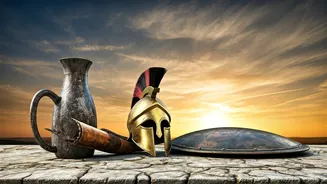Embrace Mythological Storytelling
Introducing children to mythology is like opening a door to a vibrant world filled with heroes, gods, and fantastical creatures. These stories are far
more than just entertainment; they are powerful tools for character development. Through mythological narratives, kids learn about courage, resilience, and the consequences of actions, whether good or bad. Furthermore, these ancient tales foster imagination, as the settings and characters are often beyond our everyday reality. They also provide cultural context, explaining traditions and values from around the globe. Myths are a way for children to understand their own place in the world by learning about the shared human experience.
Rama: The Ideal King
Rama, the central figure in the epic Ramayana, is often revered as an ideal ruler and a symbol of righteousness. His story chronicles his exile, battles against the demon king Ravana, and his unwavering devotion to his wife, Sita. Rama's commitment to dharma (righteousness) and his embodiment of virtues like truthfulness and compassion make him an excellent example for children. His life provides lessons on family values, loyalty, and facing adversity. Kids can learn how Rama always strives to do what is right, even when faced with extreme challenges, and how he never falters in upholding his principles, making him a model of integrity and self-discipline.
Hanuman: The Devotee
Hanuman, the devoted monkey-god, is celebrated for his strength, loyalty, and unwavering devotion to Rama. His heroic feats, such as leaping across the ocean to find Sita, capture the imagination of children. Hanuman’s humility and willingness to serve Rama make him a fantastic role model. His story reinforces the importance of faith and dedication to a higher purpose. Children can learn about the power of unwavering belief and how Hanuman's dedication helped Rama to win against all odds. Hanuman also embodies the virtues of service, humility, and courage, and showcases how devotion and strength can be harmoniously combined.
Krishna: The Divine Teacher
Krishna, an avatar of Vishnu, is known for his wisdom, love, and playful nature. The stories of his childhood, such as the stealing of butter and his interactions with the gopis, entertain and teach. His teachings in the Bhagavad Gita provide profound insights into life and duty. Krishna is a versatile character, who acts as a friend, teacher, and divine guide. Introducing children to Krishna helps them understand the concepts of dharma, karma, and the importance of living a meaningful life. His stories often show how to navigate through challenges with grace and wisdom and his example provides lessons in love, compassion, and spiritual understanding.
Arjuna: The Warrior
Arjuna, the central warrior in the Mahabharata, confronts a moral dilemma before the great battle. Krishna, his charioteer and guide, teaches him the profound lessons of the Bhagavad Gita. This part of the epic offers a rich exploration of duty, morality, and the search for meaning. Arjuna’s internal conflict and his eventual triumph over it provide an inspiring example of how to tackle difficult choices. The story encourages children to think about what is right and wrong, and the importance of moral courage. His journey highlights the need to find strength and clarity in challenging situations and provides a guide for making ethical decisions.
Perseus: The Hero
Perseus, a hero from Greek mythology, is renowned for his bravery in slaying the Gorgon Medusa. His journey, marked by perilous quests and divine assistance, is filled with thrilling adventures. Perseus demonstrates courage in the face of fear and the importance of resourcefulness. The story encourages children to face their fears, seek help when needed, and persevere through tough times. His story teaches the value of bravery, cleverness, and how heroes can overcome great obstacles with divine guidance. Perseus serves as a prime example of someone who overcomes seemingly insurmountable odds, making his journey highly inspiring to young audiences.
Hercules: The Strength
Hercules, known in Roman mythology as Heracles, is famous for his incredible strength and completion of the twelve labors. These tasks, often dangerous and challenging, showcase his physical power and resilience. Hercules’ story teaches children about perseverance, the value of hard work, and the importance of overcoming challenges. His struggles and eventual triumphs highlight the role of dedication and the rewards of facing adversity. Children can draw inspiration from his strength and his persistence. The tales of Hercules also demonstrate how one can evolve and grow through facing difficult trials.
Theseus: The Athenian King
Theseus, a hero from Greek mythology, is best known for slaying the Minotaur in the labyrinth. His adventures, including his journey to Athens and his many heroic deeds, provide a window into ancient Greek values. Theseus' story teaches about bravery, justice, and leadership. The courage he demonstrates, facing both monstrous creatures and difficult political situations, makes him an excellent example for young readers. He exemplifies the characteristics of a strong leader and the importance of fighting for what is right. His adventures encourage children to aspire to do good and to show leadership qualities from a young age.
Thor: The Thunder God
Thor, the Norse god of thunder, is recognized for his immense strength and his protection of humanity. His battles against giants and other threats are filled with action and adventure. The stories of Thor offer an exciting introduction to Norse mythology and values, such as courage and the defense of the vulnerable. Thor's example illustrates the importance of using one's strength for good, and fighting for justice. Children can learn about his bravery and loyalty. His ability to overcome challenges and protect his people makes him a compelling figure who inspires children to act bravely.
Anansi: The Trickster
Anansi, the spider-trickster from West African folklore, uses his cleverness and wit to overcome challenges and gain advantage. His stories are often humorous, but they also teach valuable lessons about intelligence and ethics. Anansi shows children that smarts are just as important as strength. His clever schemes and quick thinking make him an engaging character, illustrating how to think creatively and how to find solutions. Anansi's tales provide a unique perspective on using intelligence and problem-solving, teaching the importance of both wit and ethics.
















